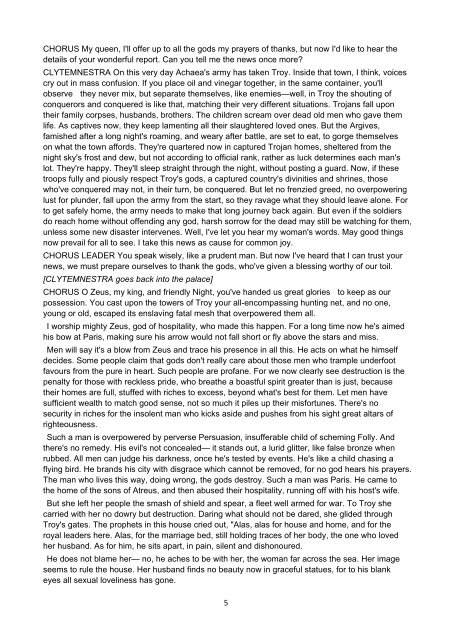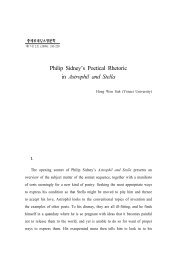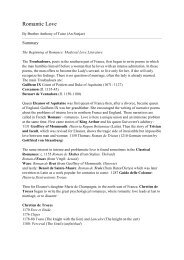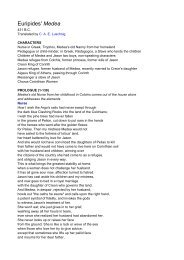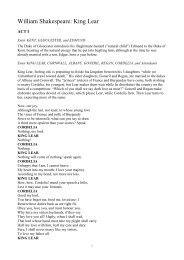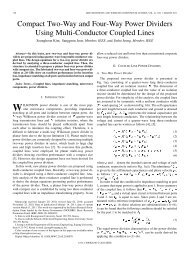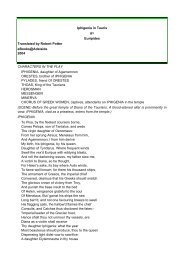Aeschylus Agamemnon
Aeschylus Agamemnon
Aeschylus Agamemnon
You also want an ePaper? Increase the reach of your titles
YUMPU automatically turns print PDFs into web optimized ePapers that Google loves.
CHORUS My queen, I'll offer up to all the gods my prayers of thanks, but now I'd like to hear the<br />
details of your wonderful report. Can you tell me the news once more<br />
CLYTEMNESTRA On this very day Achaea's army has taken Troy. Inside that town, I think, voices<br />
cry out in mass confusion. If you place oil and vinegar together, in the same container, you'll<br />
observe they never mix, but separate themselves, like enemies—well, in Troy the shouting of<br />
conquerors and conquered is like that, matching their very different situations. Trojans fall upon<br />
their family corpses, husbands, brothers. The children scream over dead old men who gave them<br />
life. As captives now, they keep lamenting all their slaughtered loved ones. But the Argives,<br />
famished after a long night's roaming, and weary after battle, are set to eat, to gorge themselves<br />
on what the town affords. They're quartered now in captured Trojan homes, sheltered from the<br />
night sky's frost and dew, but not according to official rank, rather as luck determines each man's<br />
lot. They're happy. They'll sleep straight through the night, without posting a guard. Now, if these<br />
troops fully and piously respect Troy's gods, a captured country's divinities and shrines, those<br />
who've conquered may not, in their turn, be conquered. But let no frenzied greed, no overpowering<br />
lust for plunder, fall upon the army from the start, so they ravage what they should leave alone. For<br />
to get safely home, the army needs to make that long journey back again. But even if the soldiers<br />
do reach home without offending any god, harsh sorrow for the dead may still be watching for them,<br />
unless some new disaster intervenes. Well, I've let you hear my woman's words. May good things<br />
now prevail for all to see. I take this news as cause for common joy.<br />
CHORUS LEADER You speak wisely, like a prudent man. But now I've heard that I can trust your<br />
news, we must prepare ourselves to thank the gods, who've given a blessing worthy of our toil.<br />
[CLYTEMNESTRA goes back into the palace]<br />
CHORUS O Zeus, my king, and friendly Night, you've handed us great glories to keep as our<br />
possession. You cast upon the towers of Troy your all-encompassing hunting net, and no one,<br />
young or old, escaped its enslaving fatal mesh that overpowered them all.<br />
I worship mighty Zeus, god of hospitality, who made this happen. For a long time now he's aimed<br />
his bow at Paris, making sure his arrow would not fall short or fly above the stars and miss.<br />
Men will say it's a blow from Zeus and trace his presence in all this. He acts on what he himself<br />
decides. Some people claim that gods don't really care about those men who trample underfoot<br />
favours from the pure in heart. Such people are profane. For we now clearly see destruction is the<br />
penalty for those with reckless pride, who breathe a boastful spirit greater than is just, because<br />
their homes are full, stuffed with riches to excess, beyond what's best for them. Let men have<br />
sufficient wealth to match good sense, not so much it piles up their misfortunes. There's no<br />
security in riches for the insolent man who kicks aside and pushes from his sight great altars of<br />
righteousness.<br />
Such a man is overpowered by perverse Persuasion, insufferable child of scheming Folly. And<br />
there's no remedy. His evil's not concealed— it stands out, a lurid glitter, like false bronze when<br />
rubbed. All men can judge his darkness, once he's tested by events. He's like a child chasing a<br />
flying bird. He brands his city with disgrace which cannot be removed, for no god hears his prayers.<br />
The man who lives this way, doing wrong, the gods destroy. Such a man was Paris. He came to<br />
the home of the sons of Atreus, and then abused their hospitality, running off with his host's wife.<br />
But she left her people the smash of shield and spear, a fleet well armed for war. To Troy she<br />
carried with her no dowry but destruction. Daring what should not be dared, she glided through<br />
Troy's gates. The prophets in this house cried out, "Alas, alas for house and home, and for the<br />
royal leaders here. Alas, for the marriage bed, still holding traces of her body, the one who loved<br />
her husband. As for him, he sits apart, in pain, silent and dishonoured.<br />
He does not blame her— no, he aches to be with her, the woman far across the sea. Her image<br />
seems to rule the house. Her husband finds no beauty now in graceful statues, for to his blank<br />
eyes all sexual loveliness has gone.


